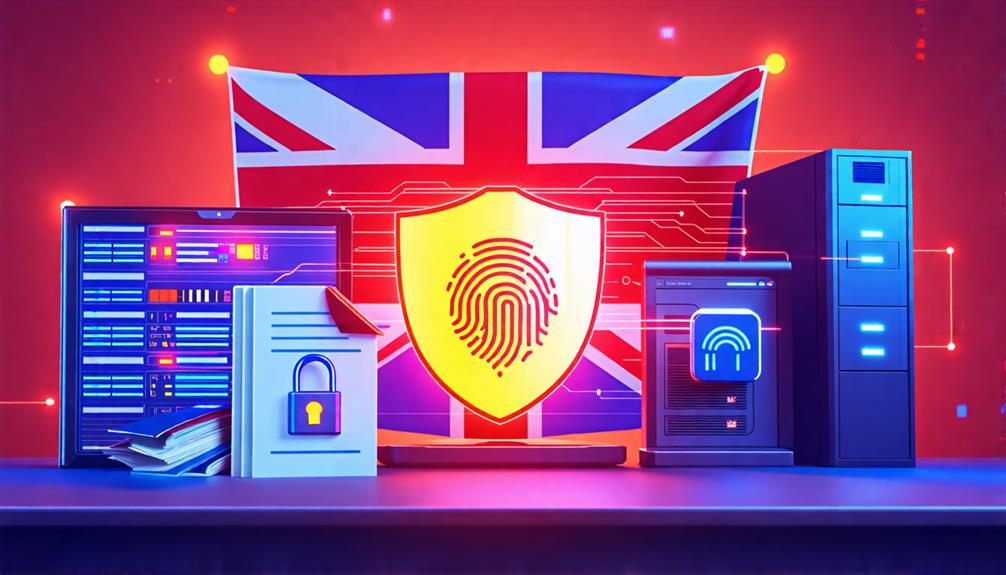The top five data protection requirements for clearance in the UK involve rigorous procedures to shield sensitive data.
These key regulations encompass the Baseline Personnel Security Standard (BPSS), which guarantees comprehensive pre-employment vetting, and the Accreditation Check Process (AC), designed specifically for aviation industry security.
The Counter Terrorist Check (CTC) delivers additional examination for those requiring access to high-risk zones, whereas the Security Check (SC) and Enhanced Security Check (eSC) offer multi-tiered security for positions demanding access to SECRET and TOP SECRET resources.
Each of these provisions includes meticulous identity, employment, and criminal record reviews to uphold national security.
For a deeper understanding of these crucial protocols, further investigation is suggested.
Baseline Personnel Security Standard
The Baseline Personnel Security Standard (BPSS) is a comprehensive pre-employment screening process for individuals who need access to sensitive government assets. It is a key component in national security vetting and involves several important checks. These checks verify the individual’s identity, employment history, national and immigration status, and unspent criminal records. Additionally, any substantial time spent overseas is closely examined to minimize risks linked to foreign influence.
Although not a formal security clearance, BPSS is required for anyone who needs access to the Public Services Network (PSN). It holds specific relevance for roles that may involve access to SECRET and TOP SECRET information. It provides a baseline for more advanced security clearances, such as Security Check (SC) and Developed Vetting (DV).
The BPSS was updated in June 2024 to keep pace with the continuing changes and to stay compliant with the changing security needs within the UK government. BPSS serves as a fundamental level of security, confirming that individuals appointed to sensitive roles have been subject to stringent background checks. This upholds the security and trust necessary for national interests.
Accreditation Check Process
The Accreditation Check (AC) process, based on the fundamental principles of the BPSS, amplifies security measures by endorsing the credentials of individuals who require access to confidential areas within the aviation industry. This key process for maintaining aviation security includes meticulous assessments to affirm that only approved and vetted personnel are allowed to enter essential operational zones.
The validity of AC clearance is up to 5 years, subject to the provision of regular data from the sponsoring organization. If continuous data updates are not provided, the clearance is restricted to a span of 12 months.
The process encompasses:
- Identity Verification: Ascertaining the individual’s identity through comprehensive documentation checks.
- Employment and Education History: Scrutinizing the individual’s former employment and educational background to affirm consistency and dependability.
- Criminal Record Check: Performing an unspent criminal record check against UK Government records to detect any potential security threats.
- Access to Identification Cards: Conferring successful candidates with Airport Identification Cards or UK air carrier Crew Identification Cards, which are critical for roles in aviation security.
This stringent accreditation affirms that only those who uphold the utmost standards of integrity and dependability are granted responsibilities that influence aviation security, including air cargo security and UK aviation security training.
Counter Terrorist Check
The Counter Terrorist Check (CTC) is a strict screening process constructed to verify that individuals given access to high-risk areas have been thoroughly examined for possible security threats. This clearance is required for roles vulnerable to terrorist attacks, ensuring that only vetted individuals are permitted to operate in these high-security environments.
Periodic review of CTC clearance is mandatory, every 10 years, or every 5 years for non-List X contractors, to ensure continuous appraisal of the individual’s fitness.
The CTC process consists of several important checks. To begin with, individuals must fulfil the Baseline Personnel Security Standard, followed by a Security Questionnaire. Mandatory checks against criminal records and Security Service (MI5) records are carried out. All these measures combined verify that only those who are not a security risk are granted clearance.
CTC clearance holders may have unescorted access to establishments that are at risk of terrorist threats, improving the overall security of these places. The ability given to risk owners to review CTC clearance at any time strengthens proactive security management.
This capability for continuous review allows for immediate action if any concerns surface, keeping the integrity of sensitive areas intact.
Security Check Requirements
Building on the stringent security precautions, the Security Check (SC) clearance requires a comprehensive set of validations to affirm that individuals are appropriate for access to sensitive information and settings.
SC clearance is imperative for those needing consistent, unrestricted access to SECRET assets, and occasional, supervised access to TOP SECRET assets. The SC clearance procedure includes a range of checks for thorough vetting.
- Baseline Personnel Security Standard (BPSS): This initial stage includes identity verification, employment history, nationality and immigration status, and a criminal record check.
- Security Questionnaire and Departmental/Company Records Check: Applicants fill out an in-depth questionnaire about their personal history. At the same time, the pertinent department or company carries out checks on internal records.
- Criminal Record and Financial History Checks: These checks delve into any previous criminal behavior and scrutinize the applicant’s financial stability, which is crucial in reducing potential vulnerabilities to exploitation.
- Security Service (MI5) Records Check: This check includes a review of MI5 records to find any issues related to national security. Additional checks may be carried out on third parties linked with the applicant if needed.
Moreover, SC clearance needs to be revisited every 10 years, or every 5 years for non-List X contractors, with discretionary reviews by the risk owner at any point.
Enhanced Security Check
The Enhanced Security Check (eSC) is a vetting process designed for roles with a requirement for regular uncontrolled access to SECRET assets and occasional controlled access to TOP SECRET assets. These roles require a high level of trust and responsibility, and may involve access to SECRET code word material.
The eSC includes several comprehensive checks to verify personnel reliability. These checks involve the completion of the Baseline Personnel Security Standard, a comprehensive Security Questionnaire, and meticulous reviews of both departmental/company records and criminal records.
The eSC, through these checks, aims to establish a strong security structure that mitigates the risks associated with access to sensitive information.
Although the eSC does not have the same intensity as Developed Vetting (DV), which is used for the most sensitive positions, it is built to address changing security needs without sacrificing the depth of the vetting process.
Through frequent updates and reviews, the eSC process stays aligned with current security requirements, supporting the integrity and reliability of personnel in pivotal roles. This method resonates with the commitment to protect sensitive information while adjusting to changing security environments.
Conclusion
The United Kingdom’s pathway to data protection clearance is marked by strict procedures. This includes the Baseline Personnel Security Standard, Accreditation Check Process, Counter Terrorist Check, Security Check Requirements, and Enhanced Security Check.
These key components work to verify that those dealing with sensitive data adhere to stringent security criteria.
To protect national security and uphold the integrity of the UK’s data protection framework, abiding by these requisites is critical in reducing the potential threats linked to unauthorized data access.



